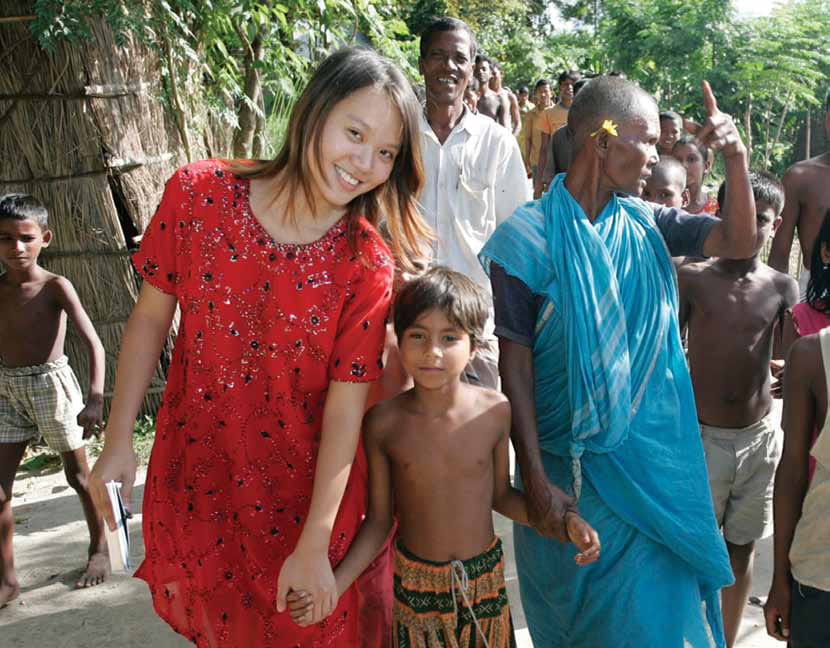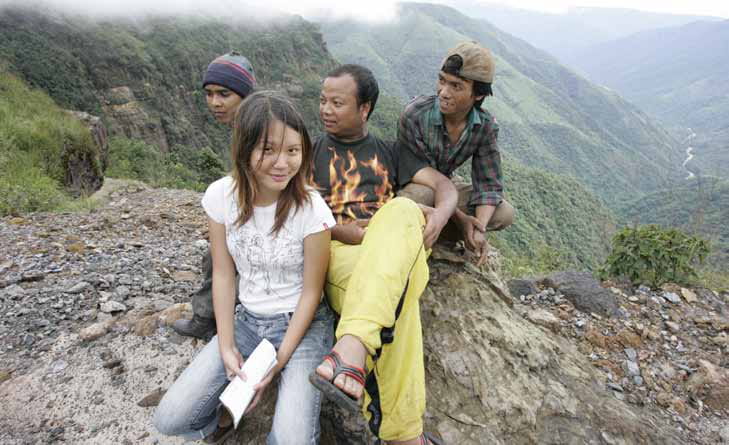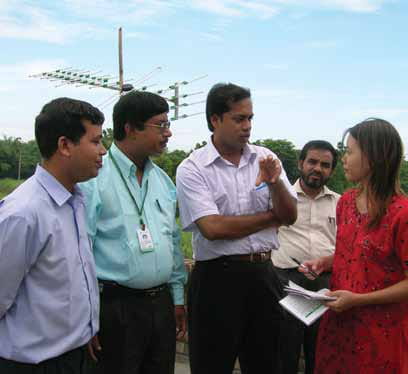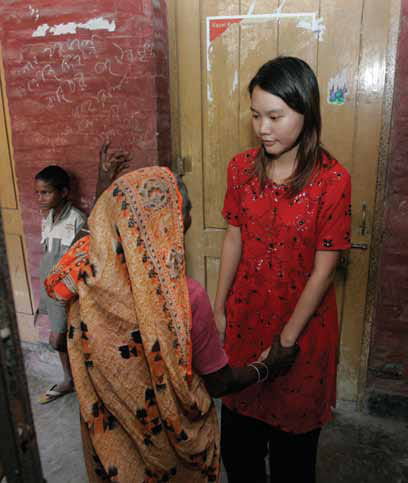Stories > Blazing The Trail
Blazing The Trail

BLAZING THE TRAIL
Adrianna Tan is a trailblazer on many fronts in the digital and social spheres. Her latest mark is in India, on a mission to improve the lot of girls of the Subcontinent through good education.
By Kim Lee
t was the start of a journey that would last longer than the trip’s three weeks,” observes Adrianna Tan. The 27-year-old trailblazer, self-confessed geekette, writer, traveller, multi-tasker and entrepreneur is one of Singapore’s most well-known bloggers (popagandhi.com) and commands a formidable Twitter following in the region of 10,000. She’s also the brain behind the first ever Failcon Singapore, a convention backed by the philosophy of embracing and learning from failure, an anomaly of a concept in success-driven Singapore; and the Singapore edition of SuperHappyDevHouse, a prime hackathon event that started in California’s Silicon valley. A hackathon is a freestyle networking event for people to explore entrepreneuring ideas and collaboration in the tech sector. Both are premier events in the tech community here.
Adrianna talking to doctors and field workers in northern Bangladesh about the impact of diseases on local village population to find out about obstacles faced by locals in administering public healthcare initiatives.
“It was an image which stayed with me for the next 10 years. I found myself wanting to help create those right opportunities for even more girls if I could.”
The trip she speaks of was Project Akriti, a Singapore International Foundation mission led by National University and the rest of the student team worked with Kolkata-based NGO Sanlaap, which has been combating the trafficking of women and children and rehabilitating those rescued since 1987. It was Tan’s first trip to India and it sowed the seeds for her own NGO, the Gyanada Foundation (gyanada.org). The organisation, which had its soft launch in March 2013, focuses
on education for underprivileged girls in India.
Desire and Direction
“We provided some English lessons and some basic computer facilities. We also helped to redecorate a youth centre which they ran in Kolkata, which kept at-risk children off the streets. Through the collaboration, our team learned from the fieldworkers about the challenges and issues that they face.
“We were exposed to many underprivileged, under-served sectors of Kolkata society. You learn that if you are a child of a prostitute, you rank pretty low on the pecking order and it would be a miracle if you even got any opportunities, what more, respect from society. (There were) women who had no skills because they knew no life other than the prostitution they had been forced into. It’s hard for them to lead a life we know as ‘normal’. That was the toughest thing for me, to see that this playing field was completely different from anything that I knew.
“I recall an occasion at a youth centre run by the NGO Sanlaap, when an older girl was treated like a rock star because she was the first girl from that (improverished) background to go to university.
There was a sense of awe and palpable inspiration among the younger girls. If given the right opportunities, they would have wanted that for themselves as well.
“I was struck by that. It was an image which stayed with me for the next 10 years. I found myself wanting to help create those right opportunities for even more girls if I could.
“This trip shaped my relationships — with India, with volunteerism, even with what I wanted to do in the future. I was 19, in my first year of university and quite unsure of what I was going to do after that.”
Trailblazing Digital Native
Growing up with the Internet and social media, Tan sees herself as a digital native. She’s been using social media platforms to explore a range of initiatives to promote thinking beyond the self, nurture Singapore’s evolving political and cultural scene and make the world a better place.
At 27, she is also an established entrepreneur, having started mobile app development company Pen to Pixel, and another technology company, Tofusoft. With her social and digital media consciousness, she was a natural to initiate the Singapore editions of Silicon Valley hackathon event SuperHappyDevHouse (superhappydevhouse.sg), and FailCon (singapore.thefailcon.com).
SuperHappyDevHouse Singapore took off from the original US event in 2005. Billed as a party for hackers and thinkers, it combines serious and not-so-serious productivity with fun. The free event is open to all creative and curious people interested in sharing and exploring technology and collaborations with an eye to encouraging innovation and entrepreneurship. The Singapore version began in 2011 at PigeonHole, a shophouse cafe. It drew over 200 people with its mix of fr ee-flow coffee and Red Bull, a buffet dinner and wi-fi. Considered wildly successful, the annual all-day, all-night event drew 250 at its third edition at The HUB Singapore.
Meanwhile, FailCon Singapore, Asia’s first of an international conference that started in 2009 for technology entrepreneurs, investors, developers and designers to study their failures to better understand how to succeed, sold out all 300 place s at TAB nightclub in Orchard Road. Sponsored by National University of Singapore and the National Research Foundation among others, it aimed to de-stigmatise risk-taking and failure by exploring failure in an Asian context.

Adrianna has also been on the advisory board of global conference Social Media Week, that connects people, content and conversations on emerging trends in social and mobile media. Her other “quirky” social initiatives can be found at thisis.sg.
“The difference between funding a little girl in school in India at age five, and not providing that, can sometimes mean she can’t go to school at all.“
Joining the Dots
How does all this connect with educating Indian girls with Gyanada?
Tan says she brings to Gyanada ‘communications, international relationships, and a bucketload of enthusiasm’ as well as her technical and social media skill set, which make possible Gyanada’s crowdfunding campaign, blog, Twitter and Facebook presence and marketing campaign.
These efforts have created a significant network in India, as much home to her as Singapore. Having visited the country over 50 times in the past 10 years has given her significant insights.
Up with Education
As for the foundation’s educational focus, Tan adds, “I feel strongly about women’s issues, from access to education and healthcare, to contemporary problems faced by women in more modern and developed societies. It is a broad area I have an overarching interest in. However, I see education as a tool which is not only uplifting emotionally, but economically as well.”
For Adrianna, education has visible goals. “The difference between funding a little girl in school in India at age five, and not providing that, can sometimes mean she can’t go to school at all. The situation is really quite dire still, despite the progress of universal education at a primary level, and there’s still a lot to be done.” While she acknowledges that there are many other causes which are just as urgent, she has a personal investment in this one due to her strong belief in the benefits of education.
That belief likely came from her family. “My family was not particularly well-off but my dad inspired me a lot,” says Tan. “He’s a laboratory technician at the National University of Singapore’s Faculty of Dentistry and knows education is important. He also feels the responsibility to help the lower income families in our neighbourhood who could not afford tuition. As a child, we always had kids coming in and out whom he would tutor for free or very little money. I was moved and influenced by that. I am trying to use my talents, skills and connections to do the same thing as my father, but scaled up.”
“They inspired me to think that this is what it was supposed to be, that you could take charge of your life. It was very empowering.”
“Although my family was very typical in many ways — HDB (Singapore’s public housing) dwelling and regular jobs — they really instilled in my brother and I the idea of being the best at what you’re good at instead of saying you have to be a doctor or make X amount of money. They encouraged my writing talent although they didn’t have any writing inclinations themselves. As for things that you are supposed to do, they encouraged us to ask ourselves why. They discouraged me from taking government scholarships because they believed I was not going to love it and it wouldn’t let me develop as a person. I was very lucky to have those possibilities.”
Besides her family, other individuals with passion and convictions also left an impression her. During her teens and later after Junior College, as a young adult, she met people who had done “interesting things” — lawyers working for a cause, bankers who also ran their own restaurants. “They inspired me to think that this is what it was supposed to be, that you could take charge of your life. It was very empowering.”
Her foundation’s moniker, Gyanada, is another name for Saraswati, the goddess of education and learning in Hinduism. “We are strictly secular, but the name lends us the Indian connection,” explains Tan.
To find girls to educate, Gyanada works through its education NGO partners. The girls apply for various scholarship and funding schemes through them and Gyanada provides one of the sources of funding.
First Things
Gyanada was set up in Singapore because it helps it reach out to the international non-resident Indian community, the overseas Indian diaspora, and a large group of people who are open and keen to help the foundation’s cause. “It was also far easier to set up here,” admits Tan. “We started the process of incorporating a trust in India at the same time we set up Gyanada in Singapore. Gyanada India is not yet ready legally and will take more paperwork before we are done.”
Meanwhile, she reveals that they are putting together the road map for next year’s programme, which will expand their basic model of financial funding for more girls and more states through more education NGOs. As such, there are plans to hire some full-time field workers. “We need three times more money than we had raised if we want to double the number of supported girls and also run some co-curricular programs. We also want to do policy research work in education policy, and that costs money as well. We will need to expand our network of donors.“
A shared moment at a rural hospital in Bangladesh.
“As a child, we always had kids coming in and out whom (my father would) tutor for free or very little money. I was moved and influenced by that.”
Even though Gyanada is a work-in-progress, Tan is pleased and excited to say that they have sent about 150 girls to school in four states in India for the academic year 2013/2014. Eventually they would like to move beyond financial funding and into personal development, vocational and industry attachments such as internships but they are aware that the priority is to put them in school first.


